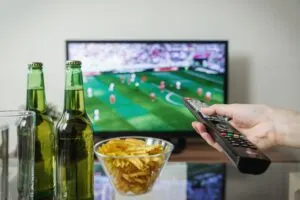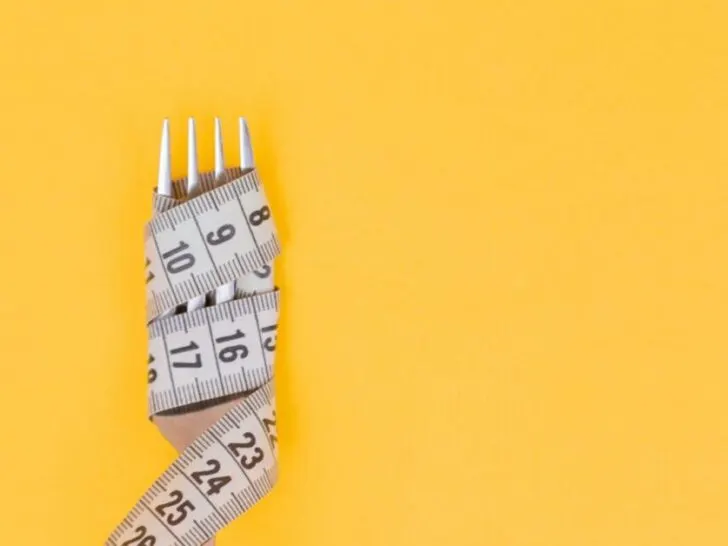Some of the links in this post are affiliate links. This means if you click on the link and purchase the item, we will receive an affiliate commission from the vendor at no extra cost to you. These business relationships allow us to keep bringing you great EatMoveHack content. All opinions remain our own.
You step on the scale and wonder how the number rose from last week. You are surprised by the unintentional weight gain. At least, you can’t think of anything you ate or did differently to explain the increase. But that may be the crux of the problem: what’s causing your unexplained weight gain is something that’s hard to see and capable of sneaking on the pounds quickly.
We are constantly bombarded with junk foods that are highly processed and are high in sodium, refined sugar, and refined carbohydrates. People are struggling to find the right balance and are open to developing healthy habits. It is easy to have a slow creep in increased calorie intake caused by poor food choices.
The good news is once you become aware of the subtle triggers making your scale tick upwards, you can put an end to the trend, take control of your health, and start to lose and manage the weight. Here are some not-so-obvious culprits to be mindful of in your pursuit of a healthy, trim body.
Food Presentation and Allure
 Let’s take a quick assessment. Are you used to big-serving sizes when you eat at restaurants? Do you automatically grab a second helping at home? Have you reached for food products from the grocery store shelves simply because they look good? Are you attracted to energy-dense foods? Are you falling victim to food cravings that are leading to poor food choices?
Let’s take a quick assessment. Are you used to big-serving sizes when you eat at restaurants? Do you automatically grab a second helping at home? Have you reached for food products from the grocery store shelves simply because they look good? Are you attracted to energy-dense foods? Are you falling victim to food cravings that are leading to poor food choices?
If the answer to any of these questions is yes, you’ve identified one of the triggers. Your probably consuming more calories per day than you intend. If you are not paying attention to what, how much, and how often you eat it will lead to consequences. Failing to have this awareness is a surefire way to experience unintentional weight gain. But you can take steps to avoid the allure of waistline-expanding foods and overeating.
Start by zeroing in on the food you consume. Examine calorie counts, check for ingredients that interfere with metabolism, and make a conscious effort to cut back on portions. An easy way to do this is by splitting a meal at restaurants with another person (or bringing half home for later). Restaurants are notorious for “over-serving” customers leading to excess food consumption of high-calorie foods. Ask for a to-go box when your meal arrives, put half in the box, and eat the rest. This is a great way to watch food intake and save money. Win-Win.
At home, portion control is still an issue. Try to stick to one serving. The same strategy above works well at home. If you make a large meal before you sit down to eat go ahead and pack some away in the fridge.
Be cognizant and wary of food ads too; they can trick you into unhealthy gorging leading to an unintentional uptick in calorie intake. Take time to think before you eat. When you slow down, plan, and focus, you’ll improve your diet and be more likely to avoid weight gain over time.
Technology
 Browsing the web, watching videos, and catching the latest Netflix series are all easy ways to pass time. But you can get so caught up in the screen activities that you lose all track of time and miss out on doing things your body needs to stay fit and healthy.
Browsing the web, watching videos, and catching the latest Netflix series are all easy ways to pass time. But you can get so caught up in the screen activities that you lose all track of time and miss out on doing things your body needs to stay fit and healthy.
The habit-forming nature of technology only adds to the harm of this subtle trigger for weight gain. While it takes determination and willpower to kick the tech habit, there are many satisfying ways to fill the time that promote a healthy weight.
Get outside and enjoy the sunshine and fresh air with some physical activity like an invigorating jog, hike, or bike ride. Spend the afternoon working in the garden. Head to the mall for a brisk walk and some mind-stimulating browsing, or get energized in a Zumba class at the gym.
By making the effort to veer away from sedentary activities and toward movement, you’ll feel more energized, keep weight gain at bay, and boost your health long term.
Stress and Worry
 Elevated stress levels can be one of the most insidious triggers for weight gain, especially if it involves stress eating, where people subconsciously reach for unhealthy comfort foods to pacify their worry, anxiety, or nervousness.
Elevated stress levels can be one of the most insidious triggers for weight gain, especially if it involves stress eating, where people subconsciously reach for unhealthy comfort foods to pacify their worry, anxiety, or nervousness.
Stress releases the stress hormone cortisol. Studies have shown that cortisol is directly linked to over unintentional weight gain. We are controlled by our hormones and understanding the connection between cortisol levels and your eating habits will help you make better food choices.
One surefire way to increase your cortisol (which is a bad thing) is to fail to get sufficient hours of sleep. Even a slight lack of sleep is directly connected to a jump in this stress hormone. I know that it is easy to say that you should avoid sleep deprivation, but here are some healthy biohacking tips for healthier sleep.
The instant gratification that results may give temporary relief, but you will put yourself at risk for emotional eating, weight gain, and weight-related illness. Fortunately, you have options for tackling stress that won’t add inches to your midriff.
One way is to swap food for stress-reducing activities you enjoy, like meditation, visiting with a friend, taking a warm bath, reading, or engaging in a fun hobby. If food is still your preferred antidote, switch to healthier options. Sub out the potato chips for nuts or popcorn and satiate your sweet tooth with fresh fruit and yogurt. When it comes to stress eating, you have the power to control your thoughts and choices and keep worries from causing you to gain weight.
Weight-Packing Pharmaceuticals
Pharmaceutical drugs are often necessary to manage a health condition. They can also have the unwanted side effect of weight gain, which you may not notice right away. One such prescription that is notorious for unintentional weight gain is the use of birth control pills. Still, if you take medication regularly and see the scale creep up, there may be a connection.
In fact, a study has shown that up to 15 percent of weight problems are related to medications, which can cause increased hunger, promote fluid retention, inhibit the body’s ability to burn calories, or manipulate appetite.
Of course, ditching your meds isn’t a recommended course of action, but you can talk to your doctor about other options for treating your condition. Sometimes it takes trial and error to find a medication that works without the undesired consequence of extra weight.
A medical professional will be able to guide you in the effort. Consider exploring natural remedies to treat ailments, too. Many have promising results and won’t cause weight gain as pharmaceutical drugs can.
Daily Diet Sodas
If you think your diet soda fetish has no effect on your weight because it doesn’t include sugar, think again. The artificial sweeteners in diet soft drinks can make you crave sugary, carb-heavy foods.
Plus, drinking diet soda regularly puts you at a higher risk of developing metabolic syndrome, a cluster of conditions that includes excess body fat around the waist. Don’t be fooled by the low-calorie count of diet soft drinks; they can be deceptive triggers for weight gain.
When you’re used to drinking diet sodas daily, finding a healthy but satisfying alternative can be a challenge. You might start by introducing other drinks into your diet. Try iced or hot teas, flavored waters, and low-sugar juices with seltzer. Drinking several glasses of plain water a day also helps reduce weight gain by suppressing appetite, helping the body burn fat, and promoting proper digestion.
Your goal should be to target real food. Diet sodas (or low-fat processed foods) are not healthy foods.
Conclusion
We often do not mean to make poor food choices. It can be very hard for people to make healthy food choices that are supported by regular exercise habits. Real food and a sufficient activity level will lead to meaningful changes to your body weight.
Putting on extra pounds leading to unintentional weight gain happens when you don’t know what’s causing the problem. Be mindful of the subtle triggers of weight gain. Doing so can help you avoid them, keep trim, and enjoy a long and healthy life.

